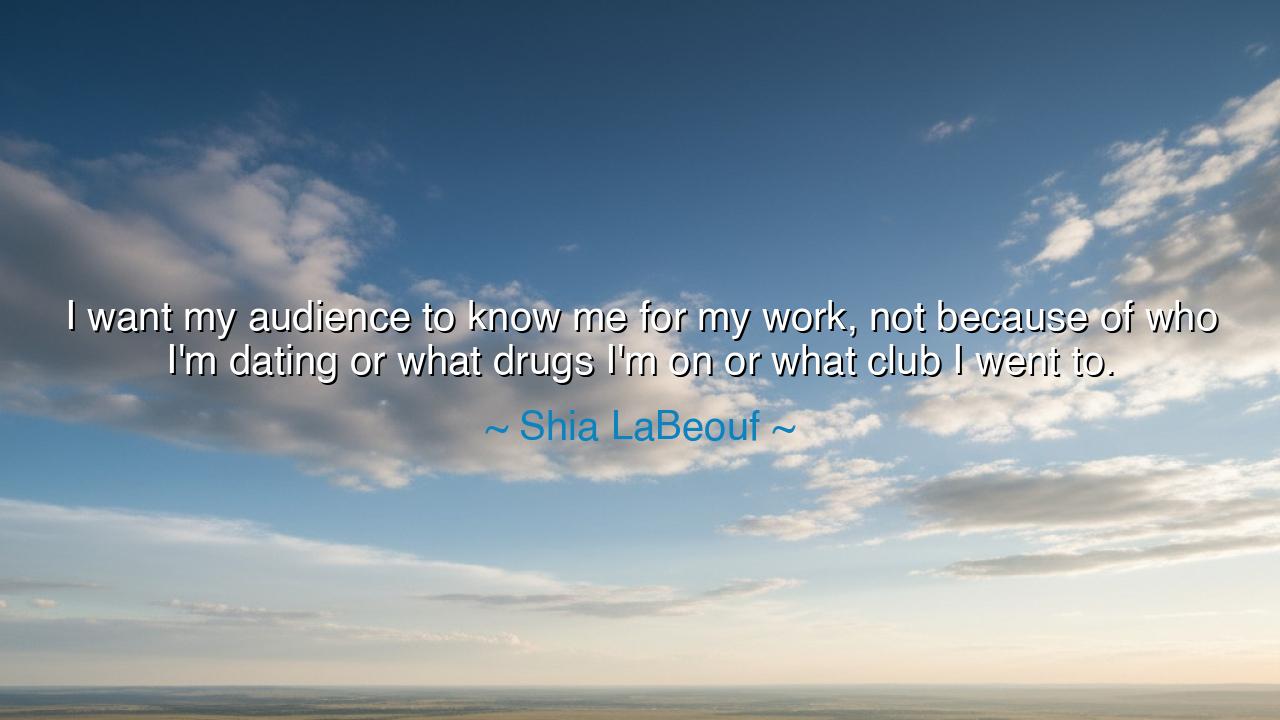
I want my audience to know me for my work, not because of who I'm
I want my audience to know me for my work, not because of who I'm dating or what drugs I'm on or what club I went to.






In the words of Shia LaBeouf, “I want my audience to know me for my work, not because of who I’m dating or what drugs I’m on or what club I went to.” — there resounds the cry of an artist who has wrestled with both fame and the longing for purity of purpose. Beneath the surface of these words lies a timeless truth: that the worth of a person must be measured by the work of their hands and the integrity of their soul, not by the fleeting shadows of gossip and spectacle. It is a truth that echoes through the centuries — the same cry uttered by poets, warriors, and sages who sought to be known for their deeds, not for the noise that surrounded them.
In the ancient world, honor was not a matter of rumor but of virtue. The Greeks called it areté — the excellence of one’s character and craft. To pursue areté was to live in alignment with one’s highest potential, undistracted by the judgments of the crowd. So too does LaBeouf speak as one who desires to return to that noble path. He wishes to be known not for the illusion of celebrity, but for the substance of creation — for the labor, the sweat, the truth that an artist breathes into their work. His words reject the hollow praise of the spectacle and seek instead the quiet reverence of those who recognize genuine artistry.
Yet his statement is also born from struggle, for Shia LaBeouf has walked through the fire of public scrutiny. Like many who rise in the harsh light of fame, he has faced the temptation of distraction — the lure of being seen rather than being understood. His declaration, then, is not simply a wish but a vow: to resist the world’s endless appetite for drama and to reclaim his identity as an artisan of meaning. It is the same vow that every true creator must make — to choose the work over the noise, the calling over the crowd.
We see a mirror of this in the story of Michelangelo, the sculptor who spent years hidden beneath marble dust, shaping beauty from stone while others sought glory in the courts of princes. When asked why he labored in solitude, he replied, “If people knew how hard I worked to gain my mastery, it wouldn’t seem so wonderful at all.” His name endures not for scandal or indulgence, but for the immortal hands that brought forth David, the Pietà, and the ceiling of the Sistine Chapel. His work was his voice, just as LaBeouf wishes his work to be his truth — untainted by the shallow noise of fame.
In LaBeouf’s words, we hear the lament of an age that has forgotten the sanctity of craft. In the days of old, the blacksmith, the painter, and the philosopher alike were measured by the devotion they brought to their art. Today, the world is filled with distractions — with lights that dazzle but do not illuminate. The artist who seeks depth must, like a monk of old, withdraw from the noise and remember that true creation requires discipline, humility, and silence. It is not the club that gives life meaning, but the workshop. Not the applause, but the honest act of making.
There is also within his quote a deeper moral struggle — the battle between the self that performs for others and the self that yearns to be real. Every human being, whether artist or not, faces this tension: the pull between external validation and internal truth. The ancients taught that to live well is to master oneself, to turn inward, and to act from purpose rather than vanity. When LaBeouf speaks of wanting to be known for his work, he is naming this ancient pursuit of authenticity — the journey from chaos to clarity, from fame to meaning.
So let this be a teaching for all who hear it: Do not let the world define you by its noise. Let your deeds speak, your craft endure, your truth shine quietly through the labor of your hands. Whether you are an artist, a teacher, a builder, or a dreamer — let your worth be measured by your work, not your reputation. Turn away from the clamor that demands you perform, and instead build something that will outlast the clapping of the crowd.
And when temptation comes — when the world’s eyes pull you toward vanity — remember the words of Shia LaBeouf, and of the ancients before him: that greatness is not in being seen, but in becoming real. Work in silence. Create with love. And let your life, like the finest art, speak long after the noise has faded.






AAdministratorAdministrator
Welcome, honored guests. Please leave a comment, we will respond soon